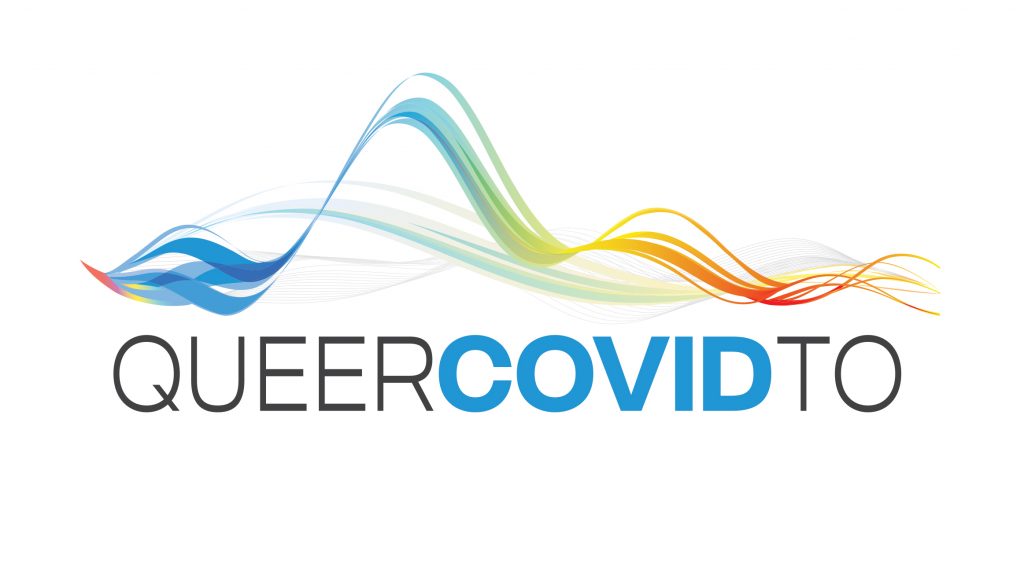This guest blog post is part of our Stories Through Research Series: Learning from UofT Researchers on How Students are Impacted by COVID-19. Each post in this series highlights three UofT research projects helping us understand student experiences and challenges in these unprecedented times. Each spotlight includes a blog post and scheduled zoom session for individuals from all areas of the University to come together as we listen, learn, and share important elements that must be engaged through conversation. Learn more at uoft.me/storiesthroughresearch.

Centering SGM voices for inclusive models of care.
Project Team: Jessica Fields (UofT), James Gibb (UofT), Sarah Williams (UofT), Ali Greery (UofT), Leela McKinnon (UofT)
To get in touch with and meet the team, come to our live zoom session next week, August 27th.
From re-closeting and renewed stigma to further marginalization and experiences of violence, COVID-19’s rearrangements of homes, regulations, and borders have impacted the safety of many people in the sexual and gender minority (SGM) community in ways that go beyond the dangers of the virus. A group of researchers have committed to better understanding and supporting the SGM community through a new research project at the University of Toronto.
Our Story:
Although COVID-19 was initially framed as a virus that does not discriminate, the virus has impacted marginalized communities in ways that mirror the existing discriminations that pervade contemporary society. One community that faces heightened risks due to COVID-19 are sexual and gender minority (SGM) people, which includes lesbian, gay, bisexual, transgender, Two-Spirit, queer, intersex, and asexual (LGBT2SQIA+) people.
A recent project, spearheaded by University of Toronto’s Department of Anthropology student, James K. Gibb, will provide ground-breaking research into how COVID-19 and its attendant public health measures are impacting SGM people in Toronto, Canada. Although the project’s home is the University of Toronto Scarborough’s Interdisciplinary Centre for Health & Society (ICHS), Gibb has assembled an interdisciplinary team of scholars, from disciplines such as anthropology, sociology, women and gender studies, geography, and public health, to investigate this urgent issue. The project, Queer Covid TO, which was recently funded by University of Toronto’s Toronto COVID-19 Action Initiative Fund, will investigate how COVID-19 prevention measures are impacting the mental health and well-being of SGM people and what strategies SGM people are employing to cope with the current health crisis.
Realities in Pandemic Times
This project is particularly pressing given what we already know about the health challenges and structural barriers that impact SGM people’s lives: Economic inequity and poverty present increased risks for SGM people. Prior to COVID-19, many SGM people worked in sectors characterized by precarity, and SGM people already face heightened economic insecurity. Early reports examining the impacts of COVID-19 measures indicate that SGM people are more likely to be concerned about financial security and to have experienced loss of income or reduced employment in the COVID-19 crisis.
The COVID-19 pandemic also escalates SGM people’s vulnerabilities to criminalization, and state-sanctioned violence. Global examples of this aggression abound. For instance, the Hungarian government is currently attempting to employ emergency COVID-19 powers to strip legal recognition and protections from transgender citizens.
In order assess the full impact of COVID-19 on the lives of SGMs in Toronto, this study will draw upon both quantitative and qualitative methods – utilizing an online survey that will reach 500 SGM respondents as well as in-depth interviews – to investigate how public health measures are impacting the health and well-being of SGM people in Toronto. This project also highlights some important questions to consider:
- How do policies, guidelines, and harm reduction strategies for quarantine and lockdown assume heteronormative family and relationship constructions? What would a public health approach built on queer kinship norms look like?
- In what ways could a university support SGM individuals and community building?
- How can staff and admin take insights from this important work and create supporting spaces for the SGM community online or otherwise?
- How will Queer COVID TO grow in the future?
Fostering Community through Connection – What Can We Do?
Through its focus on SGM communities, this research project does the crucial work necessary for ensuring that all members of our society, regardless of sexual orientation or gender identity, are receiving culturally appropriate and inclusive modes of care.

As a group, we’re looking forward to connecting with individuals in the Stories from a Distance space to share our insights, ask questions, and engage in conversation. Research of this type is critical in order to better understand the short- and long-term impacts of COVID-19 on health outcomes among SGM people.
For more information about Queer Covid TO, you can follow the project by:
- Following them on Twitter @queercovid
- Following them on Instagram @queercovidto
- A website will be provided in the coming weeks for project updates, resources and more!
Want to continue the conversation? Join us in the second half of this series in our Stories through Research Zoom Session on August 27th, 1-2pm EDT.
Sarah Williams (M.A.) is a PhD Candidate in Medical Anthropology and a fellow in the Collaborative Specialization in Global Health at DLSPH. Her dissertation research focused on maternal health and Indigenous midwifery in southeastern Mexico. Her most recent publications explore how maternal mortality rates are harnessed in unpredictable ways at local levels, and how COVID-19 is affecting midwives and maternal health care accessibility in Mexico. She is a Co-Investigator and the Qualitative Research Lead for Queer COVID Toronto.
- Additional Publications:
James K Gibb is currently a Visiting Scholar in the Department of Health and Society at the University of Toronto, where he co-leads, along with Dr. Jessica Fields the Queers and COVID-19 TO study. His research program investigates how social-economic-political-emotional (SEPE) factors shape variation in development, physiological function, and health among sexual and gender minority (SGM) people; as well as the evolutionary, ecological and biocultural processes shaping global patterns of human sexual and gender diversity. Throughout his research program, he aims to ensure that his work is inclusive, culturally appropriate, and affirming to the biologies and experiences of SGM people. James is responsible for leading the project design, including data collection, analysis, and knowledge translation, and he will lead quantitative publications that result from the research.
0 comments on “Stories Through Research Spotlight: Impact of COVID-19 on the Mental Health and Vulnerability of Sexual and Gender Minorities (SGM) Living in Toronto”